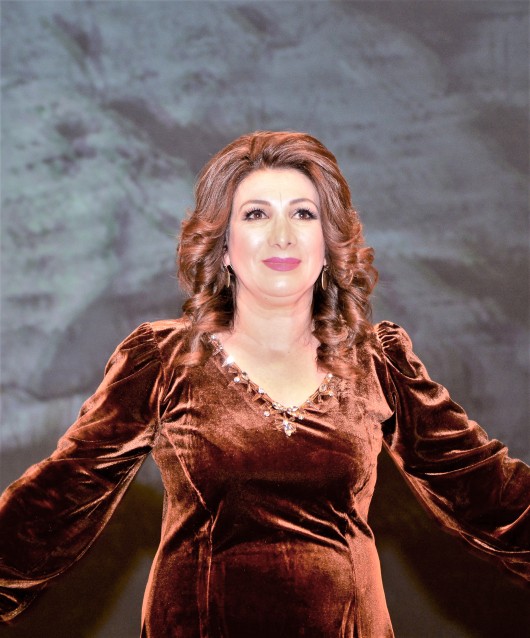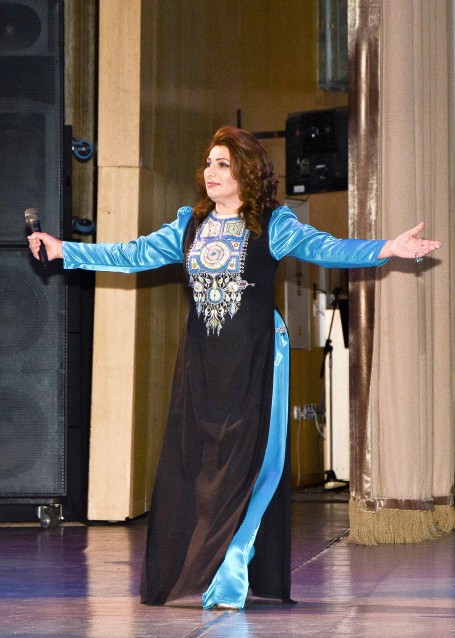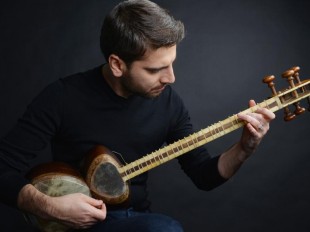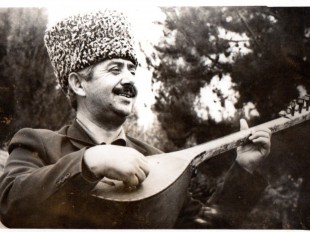It was almost summertime in the late 1980s. School had just let out for the day, and little Roza came running down the road to her home nestled in the hills of Qusar. She burst through her gate, threw her backpack down, grabbed a snack and climbed up to her favourite spot in the mulberry tree that shadowed her family’s yard. She looked to see if the juicy berries were ready to sample yet. Then, she found herself gently swaying with the branches of the trees, and began serenading the birds with the songs of the Lezghi people.
You’ve got quite the nightingale up in your tree! her neighbour told her parents. Hearing this, Roza’s heart soared and she sang louder and prouder.
I thought they were serious! Roza told me as she reminisced about her childhood. It didn’t occur to her until she was older that they might be making a joke at her expense, so instead, she took it as motivation to stay in her tree and sing her heart out.
Opportunity at the door
One day years later, in 1998, a knock came at the gate. Outside stood Sedaget Kerimova, a journalist from Baku. She had recently seen a copy of some poems that Roza’s sister Rima had written and submitted to the Lezghi-language magazine Sumar, and came to offer her the chance to study at university and work with her as a journalist. Rima and her family were flattered. However, they felt that they couldn’t accept this offer because Rima was struggling with her health at the time, and didn’t think it wise to travel far from home.
Before Sedaget could leave though, Rima piped up and said, If you would like, my sister would like to study, so you could take her with you. Sedaget was initially skeptical and didn’t want to take her, but in the course of the conversation, it came out that Roza knew how to sing. When Sedaget heard her voice, she found herself reconsidering.
As it turned out, Sedaget had helped form a Lezghi folk ensemble in Baku two years earlier. She brought Roza to meet their tar player (a tar is a small stringed instrument), Magamet muellim, and convince him that she should join their group. This girl is going to sing someday! she told him. She has quite the voice, and not the usual kind, but it has this colourful, throaty Lezghi mountain sound to it. It’s kavkazski! So it was settled. Roza was given a place among the other nightingales in the ensemble Suvar.
Sedaget was true to her word to help Roza get an education and a job. She was able to study at Daghestan State University in the philology department, and eventually went on to complete her master’s degree there. For the next 13 years, she worked for Sumar as a correspondent, writing articles in Azerbaijani, Russian and Lezghi. She also later worked for a Lezghi-language radio program and as a translator.
But all the while she kept on singing. At first Suvar only performed in small venues. They sang in Baku, and then in Daghestan for the Sharvili festival. They toured through Moscow, and eventually ended up at the Heydar Aliyev Palace, Azerbaijan’s premier performance hall. Her life entered a golden era where she was surrounded by the thing she loved the most: the music of the Lezghi people.
Birds were made to sing
I asked Roza why it was that she loved singing so much.
I think it’s really a deep need inside me. I felt it as a child, but not as much as I do now. Then, I just loved to sing and let it all out. But now, sometimes, if I don’t sing, a few times a month I feel this fullness inside me that I need to let out. I feel sick. I hurt. I’m not famous. I’m not a professional singer. My education isn’t in music, it’s in philology. But I think God just gave it to me, and I just need to sing. Probably when I’m 88 years old I’ll still need to sing.
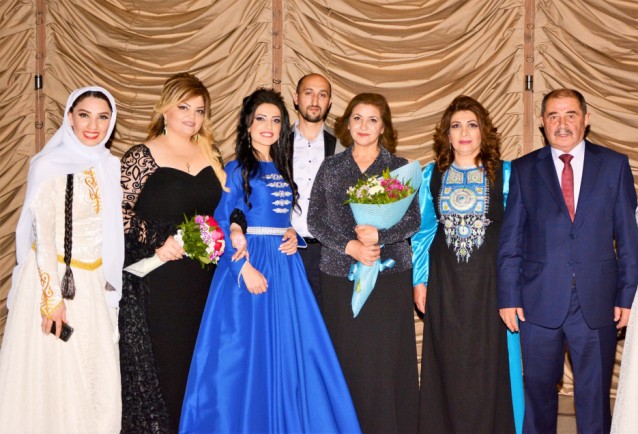 Roza (second from right) with other members of the Suvar ensemble. Holding flowers to her left is Sedaget Kerimova. Photo: courtesy of Roza Hajimuradova
Roza (second from right) with other members of the Suvar ensemble. Holding flowers to her left is Sedaget Kerimova. Photo: courtesy of Roza Hajimuradova
For the Lezghi people as a whole, music carries great significance. For the outside world too, it is their unique style of song and dance that has made its strongest impression. When one thinks of the Caucasus, one of the first images that comes to mind is wild, pounding drums, men in big hats with swords and graceful mountain princesses dancing the Lezghinka (a traditional fast-paced dance performed throughout the Caucasus and named after the Lezghi people). I asked Roza to tell me more about their music.
While there is at times a fair amount of overlap with Azerbaijani music in terms of style and content, something that is natural for two groups that have lived as neighbours for so many centuries, Lezghi musical cannon has its own unique styles and themes. Our ancient music isn’t always as rhythmic, she said. We have songs of mourning... We have heroic folk songs and work songs.
In every village, we have this tradition called a myel, where if someone wants to build a house, everyone in the entire village would come together and help them build the house. Someone would make the roof, someone would be working on the windows. Everyone. They all got together and helped for free. People would even get upset if they weren’t invited to help. I saw people complaining, saying, “Why didn’t you ask us to come, we want to help build your house!”
When they were doing this, they would get all the men in the village in one line, and all the women in another, and they would pass stones or bricks up the line to where the house was being built. And while they were handing them up the line, they would sing songs back and forth. The men would sing a line, and then the women. A lot of the songs are about love. Actually, a lot of young people fell in love doing that. They met there during the myel, and eventually there was a wedding and a new family started. I’m getting goosebumps thinking about it all!
We do have rhythmic songs. These are the Lezghi songs that people know about, but those are generally wedding songs. They have a “Kavkaz” rhythm to them. We also have one person who took some older songs and rearranged them in a more modern style. In Kulikend village, there are even some people who sing rap!
Confessions of a shy songbird
Roza has sung at her fair share of weddings, but as of late her time spent on music is more and more personal. She still joins the other nightingales for large performances sometimes, but has found that they aren’t quite birds of the same feather.
I tend to be shy for a singer. Other singers really like to show off and boast about what they can do, but I don’t. I get hesitant to show myself off on stage, so there’s been a few times where I’ve been passed over for opportunities. It comes to a point where other singers who are really in it for the money are showing off more, and they say, “Well, Roza, for her it’s all the same if she sings or doesn’t sing, so let’s not bring her along.” It really hurt me to hear those things. But Sedaget Kerimova saw this and said, “Why is it that Roza always gets left behind? Next time, you take her with you.”
Those other singers went to university for music and studied at conservatories and they are all educated, but my musical education was just sitting up in a mulberry tree in my village.
My creative life is really owed to Sedaget, Roza continued. She felt that I could sing, and invited me here, and helped me so much. And to my family. They valued creativity and our culture, and passed this on to me, and gave me a chance and even direction. They never told me not to sing. There were some families at that time that forbid their women to sing, but they never once told me not to. They really inspired me.
For Roza, singing isn’t about showing off, but simply being who she was made to be. She is, after all, a nightingale and not a peacock. You can enjoy her singing and that of the rest of her ensemble at http://sedagetkerimova.com/index.php?id=83. Her voice is the lead female voice in most of the songs in the playlist.
